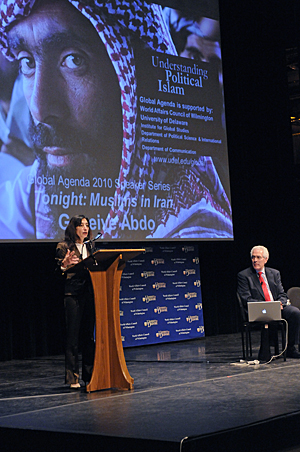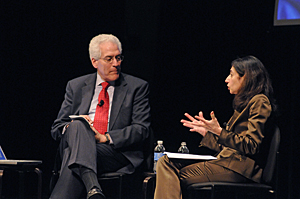

ADVERTISEMENT
- Rozovsky wins prestigious NSF Early Career Award
- UD students meet alumni, experience 'closing bell' at NYSE
- Newark Police seek assistance in identifying suspects in robbery
- Rivlin says bipartisan budget action, stronger budget rules key to reversing debt
- Stink bugs shouldn't pose problem until late summer
- Gao to honor Placido Domingo in Washington performance
- Adopt-A-Highway project keeps Lewes road clean
- WVUD's Radiothon fundraiser runs April 1-10
- W.D. Snodgrass Symposium to honor Pulitzer winner
- New guide helps cancer patients manage symptoms
- UD in the News, March 25, 2011
- For the Record, March 25, 2011
- Public opinion expert discusses world views of U.S. in Global Agenda series
- Congressional delegation, dean laud Center for Community Research and Service program
- Center for Political Communication sets symposium on politics, entertainment
- Students work to raise funds, awareness of domestic violence
- Equestrian team wins regional championship in Western riding
- Markell, Harker stress importance of agriculture to Delaware's economy
- Carol A. Ammon MBA Case Competition winners announced
- Prof presents blood-clotting studies at Gordon Research Conference
- Sexual Assault Awareness Month events, programs announced
- Stay connected with Sea Grant, CEOE e-newsletter
- A message to UD regarding the tragedy in Japan
- More News >>
- March 31-May 14: REP stages Neil Simon's 'The Good Doctor'
- April 2: Newark plans annual 'wine and dine'
- April 5: Expert perspective on U.S. health care
- April 5: Comedian Ace Guillen to visit Scrounge
- April 6, May 4: School of Nursing sponsors research lecture series
- April 6-May 4: Confucius Institute presents Chinese Film Series on Wednesdays
- April 6: IPCC's Pachauri to discuss sustainable development in DENIN Dialogue Series
- April 7: 'WVUDstock' radiothon concert announced
- April 8: English Language Institute presents 'Arts in Translation'
- April 9: Green and Healthy Living Expo planned at The Bob
- April 9: Center for Political Communication to host Onion editor
- April 10: Alumni Easter Egg-stravaganza planned
- April 11: CDS session to focus on visual assistive technologies
- April 12: T.J. Stiles to speak at UDLA annual dinner
- April 15, 16: Annual UD push lawnmower tune-up scheduled
- April 15, 16: Master Players series presents iMusic 4, China Magpie
- April 15, 16: Delaware Symphony, UD chorus to perform Mahler work
- April 18: Former NFL Coach Bill Cowher featured in UD Speaks
- April 21-24: Sesame Street Live brings Elmo and friends to The Bob
- April 30: Save the date for Ag Day 2011 at UD
- April 30: Symposium to consider 'Frontiers at the Chemistry-Biology Interface'
- April 30-May 1: Relay for Life set at Delaware Field House
- May 4: Delaware Membrane Protein Symposium announced
- May 5: Northwestern University's Leon Keer to deliver Kerr lecture
- May 7: Women's volleyball team to host second annual Spring Fling
- Through May 3: SPPA announces speakers for 10th annual lecture series
- Through May 4: Global Agenda sees U.S. through others' eyes; World Bank president to speak
- Through May 4: 'Research on Race, Ethnicity, Culture' topic of series
- Through May 9: Black American Studies announces lecture series
- Through May 11: 'Challenges in Jewish Culture' lecture series announced
- Through May 11: Area Studies research featured in speaker series
- Through June 5: 'Andy Warhol: Behind the Camera' on view in Old College Gallery
- Through July 15: 'Bodyscapes' on view at Mechanical Hall Gallery
- More What's Happening >>
- UD calendar >>
- Middle States evaluation team on campus April 5
- Phipps named HR Liaison of the Quarter
- Senior wins iPad for participating in assessment study
- April 19: Procurement Services schedules information sessions
- UD Bookstore announces spring break hours
- HealthyU Wellness Program encourages employees to 'Step into Spring'
- April 8-29: Faculty roundtable series considers student engagement
- GRE is changing; learn more at April 15 info session
- April 30: UD Evening with Blue Rocks set for employees
- Morris Library to be open 24/7 during final exams
- More Campus FYI >>
2:41 p.m., March 25, 2010----Geneive Abdo, a foreign correspondent for many years in the Middle East and the first American journalist based in Tehran after the U.S. cut ties with Iran following the 1979 Islamic Revolution, spoke about “Muslims in Iran and the U.S.” on Wednesday, March 24, in the University of Delaware's Mitchell Hall.
Her talk was part of the 2010 Global Agenda series focused on “Understanding Political Islam.”
Abdo explained that in the current political climate, one in which there are “all sorts of discussions about whether there is going to be any sort of war with Iran.”
Abdo noted that in one of his first addresses, President Barack Obama asked Iran to unclench its fist, but she added, “So far the Iranians have not.”
There has been some slow unclenching of fingers, however, and Abdo focused much of her talk on how a new political movement is forming in Iran that is in opposition to the policies of Iranian leaders, President Mahmoud Ahmadinejad and Supreme Leader Ayatollah Ali Khamenei.
“Iran today is very polarized. It's a much more polarized country today between the sort of hard liners that are running the government and the opposition on the other side that's trying to reform the system,” she said. “Somewhere in the middle there are moderate conservatives, and I'm trying to explain these different factions within the political structure because in this country it's very easy to sort of create a very black and white portrait of Iran -- that there are Westernized students on the one hand calling for change and that there are hard lined reactionary leaders who are basically creating a military dictatorship. Although these two extremes are true, there is also a middle ground in Iran that is also very important.”
Abdo said that the moderates and those who are part of the opposition movement are trying to figure out whether the current leadership is legitimate and whether Khamenei is authorized to be supreme leader, and questioning the notion of a supreme leader.
She explained, “What's happened since this crisis evolved is that Iranians are now questioning, 'How can this be an Islamic state? How can this man have had Revolutionary Guards shoot at the population, to kill Iranians simply because they're demonstrating?”
In the United States, the American public gets to see images of the demonstrations happening on the street and Abdo said that seems to spread the myth that the movement is mainly a street movement, when in reality it is having a widespread and profound impact on the political system in Iran.
“There is a lot of questioning about not only the supreme leader's legitimacy to rule, but there's also a lot of questioning now about whether it's really possible in a modern world to have an Islamic state that is run by Islamic law that also functions as a Republic -- a Republic that has free elections and whereby its citizens have a role and have a say in the government,” Abdo said.
Using survey data that was collected by people inside the country, Abdo said there are important differences between revolutionary forces today and those in the past. “We think of Iran as a country that has always been our historical adversary, and I think that one very important characteristic of this part of the opposition is that it's not necessarily anti-American,” she said. “It is an opposition movement that is very focused on reforming Iran from within. We are seeing that the movement is abandoning some of the ideological underpinnings of the revolution, one of which, of course, was Iran's anti-American stance. So the opposition is reconsidering all of these kinds of pillars, that have really perpetuated the Islamic system for 30 years.”
The movement has been moving swiftly in part because of the development of technology. Abdo said the Internet has been a great resource to help bind the demonstrators together and that advanced technology has expedited the movement, allowing those outside of the country to coordinate with those who are inside Iran.
The Iranian government counters this technological advantage by monitoring cell phones and, at times, shutting down the Internet.
There have been three schools of thought about how the United States should deal with Iran, an adversary that could develop nuclear weapons but that also has an opposition movement that could, conceivably, reform the system, Abdo said.
“Some of the more conservative parts of our political establishment argue that the only way to deal with this crisis is to have some sort of targeted or isolated military attack on Iran's nuclear facilities,” Abdo said. “Another argument is to impose crippling sanctions.”
A third option would combine strategies, she said, for instance imposing sanctions while also trying to indirectly help the opposition through technology, providing “access so that when the regime blocks the Internet, they can still communicate through various satellites and other forms of very advanced technology.”
Abdo said that the U.S. military and current political leaders oppose a military attack on Iran, and so it seems that various non-militaristic strategies will be tried.
The blossoming reform movement in Iran has Abdo hopeful for the future, and she said she believes that within that hope lies a momentous possibility for political reform.
The next Global Agenda talk will take place at 7:30 p.m., Wednesday, April 21, in Mitchell Hall and will feature Maajid Nawaz, who will speak on “Understanding Islamism.”
Nawaz is director of the Quilliam Foundation in London. For 14 years he was involved in the Islamist party Hizb ut-Tahrir in the United Kingdom, Denmark and Pakistan. He served four years in an Egyptian prison where he gradually changed his views until he renounced Islamic ideology for traditional Islam and inclusive politics.
The 2010 Global Agenda speaker series is sponsored by the UD Center for Political Communication and presented by the World Affairs Council of Wilmington, the UD Institute for Global Studies, the Department of Communication and the Department of Political Science and International Relations.
The series is moderated by Ralph Begleiter, director of the Center for Political Communication.
Article by Adam Thomas
Photos by Duane Perry


